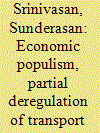|
|
|
Sort Order |
|
|
|
Items / Page
|
|
|
|
|
|
|
| Srl | Item |
| 1 |
ID:
133227


|
|
|
|
|
| Publication |
2014.
|
| Summary/Abstract |
The Indian political class is known to employ populist, albeit economically unsustainable, measures to replace intrinsic 'valence', especially shortly prior to election windows. Such measures include loan-waivers, interest rate concessions, provision of free electricity for agriculturists, etc. The union government's leverage to maneuver and to micro-manage retail fuel prices within partially deregulated environments is hypothesized to provide incumbents with an advantage over rival contestants in the electoral process. This paper analyzes the evolution in the retail prices of diesel and petrol (gasoline), and the transfer of such evolution, into the inflation index of the 'all commodity' basket. It is observed that when international benchmark prices are relatively low and domestic inflation is moderate, the transfer occurs within about 42 weeks. During periods of high oil prices-frequently above USD 100 a barrel-and high inflation-higher than 5.00-5.50%-prices of petroleum distillates tend to feed into overall inflation more rapidly, within about 34-40 weeks.
The study, covering a total of 82 elections for the central and state (provincial) governments during the period 2000 to 2013, concludes that even as patterns of manipulation of prices are apparent, ceteris paribus, such leverage does not necessarily seem to translate into favorable electoral outcomes. This conclusion reiterates observations that economic im/prudence may not necessarily determine electoral outcomes, and that the basis for electoral choices made by the Indian voter-consumer remains subjective.
|
|
|
|
|
|
|
|
|
|
|
|
|
|
|
|
| 2 |
ID:
125812


|
|
|
|
|
| Publication |
2013.
|
| Summary/Abstract |
Electric power has traditionally been classified as a non-traded good, produced and consumed within the country of origin. More recently, electricity has been traded across national borders and in certain cases, viz., Bhutan, has been the dominant export; in other situations, it is used to repay debts owed to neighboring countries. This paper investigates the role of electricity as the primary export, analyzes its valuation, and then goes on to evaluate the impact on the terms of trade. We conclude that in the medium-term, the electric power exporting economy would be better off developing its manufacturing sector to diversify its exposure and to protect its trade interests.
The case of Bhutanese hydro-electricity exports to India is studied and the change in trade advantage with every increase in power tariff is ascertained. It is found that a 1.26% annual increase in (non-food) consumer prices is correlated with a 1% increase in electricity export tariff. While the causality from electric power tariff to Indian manufactures prices is not established statistically, a change in manufactures prices feeding back into consumer prices in Bhutan is statistically significant. Suggestions are offered for Bhutan to reduce dependence on Indian imports and to diversify its export market exposure.
|
|
|
|
|
|
|
|
|
|
|
|
|
|
|
|
|
|
|
|
|